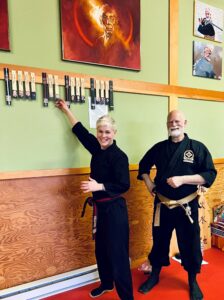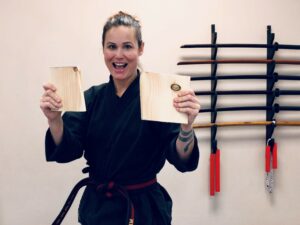
If Summit Academy’s Therapeutic Martial Arts program had a pitch woman, it would be Sensei Johanna Norris. Newly minted with a Yodan 4th Degree Black Belt, To-Shin Do (ninjutsu), Sensei Norris has trained in martial arts for nearly two decades. She has taught at Summit Academy Schools for eight years, including the past three years at Summit Academy Community School – Dayton where she also is a CPI (Crisis Prevention Institute) trainer for the school.
Sensei Chuck Rickard, Coordinator of Summit Academy’s Therapeutic Martial Arts Program, describes Norris’ recent achievement in lay terms.
“Generally speaking, a 4th degree black belt has shown the ability to understand, demonstrate, apply and teach with great depth both basic and advanced skills of their system of martial arts,” Rickard explains. He draws the example of a Master of Arts, or MA, as the academic equivalent of a 4th degree black belt.
Rickard describes Norris’ passion for martial arts and her teaching style at Summit Academy as palpable. “It’s evident in everything she does,” he says.

Norris speaks with conviction about Summit Academy’s Therapeutic Martial Arts program, describing it as groundbreaking when it began more than 20 years ago. She says that while other schools have since adopted similar programs, “none that I know of integrate martial arts into classroom education to create whole person learning and the development the way our program does.”
She emphasizes the powerful impact therapeutic martial arts can have on a child, especially one who is at risk.
“Stress is a part of every young person’s life, but it is exacerbated by learning differences or trauma experienced by many of our students,” she says.
Norris explains how the therapeutic martial arts she and her colleagues teach Summit Academy students give them the physical experience of feeling safe, whole and grounded and emotional tools to cope with stress and anxiety so they can be successful in the classroom.
“The Therapeutic Martial Arts program not only helps to balance out the nervous system with cross-lateral movement patterns, teaches balance, stability, agility and breathing techniques to remain calm under pressure,” Norris says. “but we also teach resilience and fundamental safety and awareness skills to some of Ohio’s most vulnerable young people.”
On a personal level, Norris says martial arts have been among the most empowering and enlivening aspects of her life. What began as training to learn self-defense so she could travel the globe and embrace new adventures safely soon became a lifelong love.
“I love to learn and as an adult, martial arts is endlessly interesting to me, physically and intellectually,” Norris says. Unsurprising, Norris met her husband while training and the couple now has three sons who are growing up in their To-Shin Do school, Cincinnati Quest Martial Arts. They also operate the Yellow Springs Martial Arts dojo and own and direct the Elemental Sexual Assault Protection sexual assault protection program.
Norris continues her martial arts training three times weekly in a black belt class. She also receives training at seminars and in private lessons with her teachers, Black Belt Hall of Fame martial artist Stephen K. Hayes, who brought Ninjutsu to the United States in the 1980s, and his wife, Rumiko U. Hayes.
A decorated martial artist in her own right, Norris sings the praises of earning a black belt, an achievement possible to students through Summit Academy’s Therapeutic Martial Arts program. She points out that the program is designed to enable students to earn a first-degree black belt prior to graduating from high school.
“It is a benefit to students’ future success and careers. A black belt looks fantastic on a resume,” she says. “As someone who has many times had to hire for positions, a black belt stands out as someone whom you can rely upon to have a certain level of integrity in their work.”
While earning a black belt is a matter of hard work and discipline, Norris describes her teaching position at Summit Academy as fun, a source of laughter and smiles. “The kids are fun,” she says, underscoring the satisfaction she receives witnessing her students embrace their therapeutic martial arts journey.
Rickard likens that journey to a never-ending, exuberating voyage, the experience of which Norris is passing on to her students at the highest level.
“The more you learn, the more you realize how much more there is to learn,” Rickard says. “So, in addition to experiencing being taught by a master teacher, our students get to witness firsthand how the martial arts journey works.”
